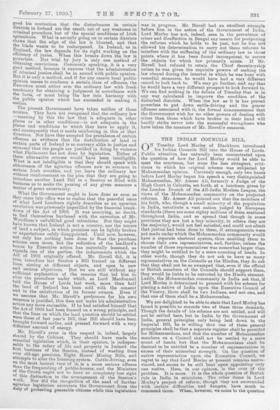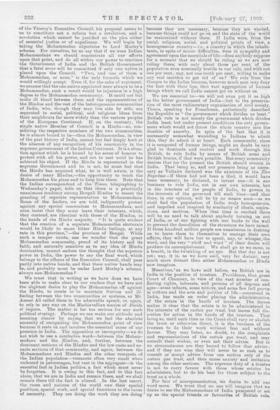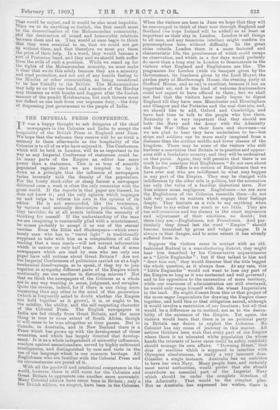THE INDIAN' COUNCILS BILL.
ON Tuesday Lord Morley of Blackburn introduced his Indian Councils Bill into the House of Lords. Public attention has naturally been concentrated upon the question of how far Lord Morley would be able to meet the courteous, but none the less stringent, criti- cisms to which his original scheme was subjected by Mohammedan opinion. Curiously enough, only two hours before Lord Morley began his speech a very distinguished Mohammedan, Mr. Ameer Ali, formerly a Judge of the High Court in Calcutta, set forth, at a luncheon given by the London Branch of the All-India Moslem League, the views of the Mohammedan community on the projected reforms. Mr. Ameer Ali pointed out that the members of his faith, who, though a small minority of the population in India, constitute a vast nation judged by European standards (there are some eighty millions of them scattered throughout India, and so spread that though in some provinces they are but a tiny minority, in others they are the majority), would not feel satisfied, and could not admit that justice had been done to them, if arrangements were not made under which the Mohammedan community would have a separate electoral system, thus enabling them to choose their own representatives, and, further, unless the number of those representatives was somewhat larger than they might be entitled to by a mere counting of heads. In other words, though they do not ask to have as many representatives on the Councils as the Hindus, they do ask that they shall not be so swamped that, even if the official or British members of the Councils should support them, they would be liable to be outvoted by the Hindu element. Lastly, the Mohammedan community in India ask that, if Lord Morley is determined to proceed with his scheme for placing a native of India upon the Executive Council of the Viceroy, there shall be two Indians, and not one, and that one of them shall be a Mohammedan.
We are delighted to be able to state that Lord Morley has found it possible to concede two of these three demands. Though the details of his scheme are not settled, and will not be settled here, but in India by the Government of India, general principles only being laid down in the Imperial Bill, he is willing that one of these general principles shall be that a separate register shall be provided for Mohammedans, and that the number of Mohammedan members on a Council shall not be settled by a mere count of heads, but that the Mohammedans shall be deemed to be entitled to a number of representatives in excess of their numerical strength. On the question of native representation upon the Executive Council, we regret to say that Lord Morley at present remains uncon- vinced, and seems to be still bent upon, appointing only one native. Here, in our opinion, is the crux of the problem. It is more. It is the whole question of British rule in India in miniature. The other items in Lord Morley's project of reform, though they are surrounded with certain difficulties and dangers, have much to commend them. When, however, we come to the question of the Viceroy's Executive COuncil, his proposal seems to us to constitute not a reform but a revolution, and a revolution which cannot be justified on the plea either of essential justice or of expediency. We will begin by taking the Mohammedan objections to Lord Morley's scheme. For ourselves, let us say that if we were Indian Mohammedans we should concentrate all our efforts upon that point, and do all within our power to convince the Government of India and the British Government that a fatal error will be committed if only one native is placed upon the Council. "Two, and one of them a Mohammedan, or none," is the only formula which we would willingly accept. Even if, for the sake of argument, we assume that' the one native appointed were always to be a Mohammedan, such a result would be injurious in a high degree to the Mohammedan community. It could not but make ill blood between them and the representatives of the Hindus and the rest of the heterogeneous communities of India, who, though they may live side bY Side, are separated in social, political, and religious ideas from their neighbour s far more widely than the various peoples of the European Continent. If, on the contrary, the single native Member of Council is a Hindu—as, con- sidering the respective numbers of the two communities, he is almost bound to be—thou the Mohammedan, in view of the past history of India, cannot.but feel deeply hurt at the absence of any recognition of hi 's community in the supreme government of the Indian Continent. It is a situa- tion against which he is bound by his sense of honour to protest with all his power, and not to rest until he has achieved his object. If the Hindu is represented in the supreme Government and he is not, he must feel that the Hindu has acquired what, he is well aware, is the desire of many Hindus,—the opportunity to teach the Mohammedan his place and to keep him there. Note that the Indian correspondent of the Times, telegraphing to Wednesday's paper, tells us that there is a practically unanimous tendency among Bengali Hindus to resent the granting of separate representation to Mohammedans. Some of the leaders, we are told, indignantly protest against any special concessions to Mohammedans, and even insist that they must leave their interests, which, they contend,'are identical with those of the Hindus, in the hands of the Hindu majority. "It is quite evident that the creation of a separate Mohammedan electorate -would be likely to cause bitter Hindu feelings, at any rate in this province,"—the province of Bengal. While such a temper exists, can we wonder that the great Mohammedan community, proud of its history and its faith, and naturally, sensitive as to any idea of Hindu domination, cannot endure the thought that the supreme power in • India, the power to say the final word, which belongs to the officers of the Executive Council, shall pass partly into native bands, and that these native bands may be, and probably must be under Lord Morley's scheme, always non-Mohammedan ?
We trust that in writing as we have done we have been able to make clear to our readers that we have not the slightest desire to play the Mohammedan off against the Hindu, to create or to maintain friction and ill- feeling between the two communities or systems, as Mr. Ameer Ali called them in his admirable speech, or, again, to rely in any way on . the Machiavellian maxim of Divide et impera. The matter is far too serious for any such political strategy. Perhaps we can make our attitude and meaning clearer by saying that we feel the absolute necessity of recognising the Mohammedan point of view because it rests on and involves the essential cause of our presence in India. The opposition or incongruity—we do not wish to use a combative word—between the Moham- medans and the Hindus, and, further, .between the dominant sections of the Hindus and the low-caste and no- caste sections of that community, and again, between the Mohammedans and Hindus and the other remauets of the Indian population—rernanets often very small when reckoned in percentages, but vast in the aggregate—is the essential fact in Indian politics, a fact which must never be forgotten. It is owing to this fact, and to this fact alone, that we are in India and remain there, and we shall remain there till the fact is altered. In the last resort, the races and nations of the world owe their special positions, special work, and special functions to the cause of necessity. They are doing the work they are doing because they are necessary, because they .are Wanted, because things could not go on and the state of the world be maintained without them. If India were, from the racial, religious, social, and political points of view,. a homogeneous country—i.e., a country in Which the inhabi- tants, in spite of' minor. difficulties, were in syrnpathy and agreement upon the essentials of life—ddes anybod.y suppose for a moment that we shimld .be ruling as we are now ruling there; with only about three per cent. of the population even nominally hostile to our rule, and with not one per cent., nay, not one-tenth per cent., willing to make any real sacrifice to get rid of 'us? We rule from the Ganges to the Indus because, however much men may deny the fact with their lips, that vast aggregation of human beings which we call India cannot get on without us.
We 'are essential to—we will not even put it so high as the better government of India—but to the preserva- tion of the Most rudimentary organisation of civil society. niers, speaking for Frenchmen, pathetically described the Republic as "the government which divides us least." British rule is not merely the government which divides India least, but under present conditions the only govern- ment which would not throw the whole country into the dustbin of anarchy. In spite of 'the , fact that it is necessarily somewhat wounding to Indians to admit this, they do admit it at heart. Each community, since it is composed of human beings, might no doubt be very glad to dominate and control and work through the British, to rule India by means of British arms and. British brains, if that were possible. But every community desires that for the present the British should remain, in India. That' being so, and our presence being as neces- sary as Voltaire declared was the existenCe of the Etre Supreme—if there had not been a God, it would have been necessary, he declared, to invent one—it is Our .business to rule India, not in our own interests, but in the interests of the people of India, to govern in the interests of the governed till such time—and that time, in our opinion, will be by no means soon—as we shall find the population of India truly homogeneous, and impelled and inspired by similarity of ideals, aspira- tions, and motives. When that time is reached there will be no need to talk about anybody turning up out of India, or of our fighting with our backs to the wall to prevent the demolition of the structure we have raised. If three hundred million people are unanimous in desiring us to leave them to themselves to manage their own affairs, they will have but to speak, nay, to whisper, the word, and the very "whiff and wind" of their desire will produce its accomplishment. We shall go as we came, in a breath, in the twinkling of an eye. But that day is not yet; nay, it is, as we have said, very far distant., very much more distant than either Mohatnuiedan or Hindu now imagines.
Meantime, 'as we have said before, we British are in India in the position of trustees. Providence, that great Court of Chancery, in view of the vast number of con- flicting rights, interests, and persons of all degrees and. ages—some infants, some minors, and some few full grown in culture and the arts and politics of life—concerned in India, has made an order placing the administration of the estate' in the hands of trustees. The decree makes it clear that the estate is to be administered in the interests of the cestuis que trust, but leaves full dis- cretion for action in the hands of the trustees. That being so, until such time as the Court shall vary or abolish the trust or otherwise direct, it is the business of the trustees to do their work without fear and without favour. They may listen, no doubt, to the complaints and repreSeutations of the cestuis que trust, and may consult their wishes, or even ask their advice. But in no circumstances are they bound to follow that advice ; and if they are wise they will never be so rash as to consult or accept advice from one section only of the cestuis qua trust, and thus cause anxiety and irritation among the other sections. The supreme duty of a trustee is not to curry favour with those whose estates he administers, but to do his best for those subject to the trust as it whole.
For fear of misrepresentation, we desire to add one word more. We trust that no one will imagine that we desire to see the Mohammedans Of India pampered or set up as the special friends or favourites of British rule. That would be unjust, and it would be also most impolitic. :Were we to do anything so foolish, the first result must be the demoralisation of the Mohammedan community, alicl the destruction of sound and honourable relations between them and us. They would at once begin to think that they were essential to us, that we could not get eu without them, and that therefore we must pity them the price of their help. In a word, they would become a sort of Pretoriau band, and they and we should both suffer from the evils of such a position. While we stand up for the rights of the Mohammedan. minority, we must make it clear that we do this. solely because they are a minority and need protection, and not out of any, hostile feeling to .the Hindus or other communities, as being considered to • be less friendly to the British. The Moha,mmedinis may help us on the one hand, and a section of the Hindus may threaten us With bombs and daggers after the foolish manner of the pundit Krishuavana, but such threats must not deflect us one inch from our supreme duty,—the duty of dispensing just government to the people of India.








































 Previous page
Previous page